Pursuing a Career in Music | Erica Lee

Erica Lee, 20, is currently a piano student at the University of Southern California studying under Dr. Lucinda Carver, and pursuing a dual degree in business administration. Erica began studying solo piano at PCM in 2006 with Dr. Susan Svrcek, and was awarded the inaugural Estelle Broussard Schlueter Piano Scholarship in 2015. Erica currently serves as a USC Thornton Student Ambassador, teaches music through the USC Thornton Engagement Program, and was PCM’s marketing, development, and program summer intern through the 2019 LACAC Arts Internship Program.
The day I received my USC acceptance envelope in the mail to study piano performance at the Thornton School of Music, I was overjoyed and relieved that I had crossed a major hurdle in my life. I was finally set on my path to play piano seriously as a career — no longer as a mere hobby. About a week later, USC mailed me a huge poster titled, “The Professional World of Music”, that categorized the numerous possibilities of a music career into an expansive, colorful, bubble map.
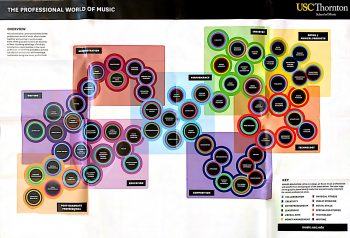
Careers on the map were organized into several clumps: Performance, Administration, Industry, Technology, Composition, Education, and more. As an aspiring pianist with a passion for performance, my eyes were immediately drawn to a relatively small clump with only a few plausible career paths for pianists. On August 21, 2017, at 10 a.m., I strolled into my very first class at Thornton, and — scotch-taped on the sidewall of my small cubicle classroom — was that exact bubble map poster. I ended up sitting in that tiny classroom every weekday morning for the next two years of college with this poster pasted within my right-eye periphery.
Since my first day at USC, I have seriously considered the idea of building a music career in fields outside of performance by declaring a business administration major through the Marshall School of Business, teaching at public elementary schools through USC’s Community Engagement Program, and now working as PCM’s marketing, development, and program intern. However as an incoming junior, the fears of an uncertain future are now pressing issues that require immediate attention as I looked toward the next phase of my life — past my undergraduate education. While there are plenty of causes for concern, the critical question of, “what do I really want to do for the rest of my life?” is one that I have never found an answer to.
Pre-college anxiety
In no way am I the only aspiring musician confused and concerned about the direction of my career, and I believe there are a few reasons why:
Firstly, a future in music warrants unpredictability, which can be equally exciting and distressing for music students who are looking towards a career. I have found that my pursuit in music includes filling the gaps in my knowledge about what the possibilities are, and then attempting to deduce from my limited experiences which paths seem to be appropriate and feasible. A friend of mine from Idyllwild Arts Summer Chamber Music Intensive, Fernando Garcia, who now studies piano performance at Indiana University’s Jacobs School of Music, shared with me that he had planned to go on to music school to gain more knowledge in music but was uncertain about which career paths would be the best fit due to a lack of knowledge about the many facets of the music education and culture.
“I don’t think (even now) that I can decide what I’m going to do with my life without at least getting more experience overall.” –Fernando Garcia, Indiana University ‘22
Secondly, music students may feel pressured to commit to music, and music only, in order to be successful. Committing to a single craft can be daunting, and majoring in music, especially, requires a great deal of sacrifice. As a USC Thornton Student Ambassador, I dare say almost every student who I have spoken to had interests in double majoring or concerns that a performance major would extinguish any flames of interest besides music. Truthfully, an intimidating aspect of college is that one’s major essentially becomes a part of their identity. Your self-introduction shifts from something like, “Hi, my name is Erica and I like to play piano”, to “Hi, my name is Erica and I am a piano major.”
If one begins to doubt their ability to pursue their craft, it is often accompanied by a fear that they are doubting who they really are as a person and student. This may possibly be the reason that students have qualms about committing to their majors in college or making impulsive decisions that may change the direction of their careers. Personally, I believe the main cause of my concern is fueled by two fears: a fear of missed opportunity and fear of misplaced priorities. I often find myself concerned that if I fail to balance my priorities and act upon them before I graduate, I will have missed my optimal opportunity for success, and that in my haste for a resolution, I may be shortsighted in my decision-making process, launching me down a one-way street with no return.
After speaking with a few prospective music students at PCM, I’ve come to realize that many do not intentionally choose music as a career path, but instead, are persuaded by their musical experiences to pursue the art. It takes a daring soul to invest one’s life into pursuing a passion, especially when the decision to major in music is driven by invaluable experiences, rather than tangible goals and stable futures. Phillip Suwandi, an incoming cello performance major at Northwestern University’s Bienen School of Music and a former student of Andrew Cook at PCM, believed that to some extent music would be a part of his life, but was convinced by his performance endeavors and participation in music festivals and tours around the world, to major in cello performance.
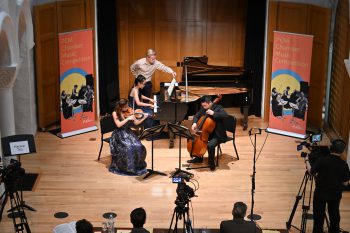
Phillip Suwandi with Piacere Trio at the 2019 PCM Chamber Music Competition
“I spent the whole summer with amazing people in amazing places, playing amazing music… I had toured Vienna, Prague, and Budapest with my clarinet trio (the Brava Trio) and seven other chamber groups. Then, I went to the Borromeo music camp in Altdorf, Switzerland. I ended the summer at the Vashon Cello Camp in Vashon, Washington. After all of those experiences, I knew definitively that I would major in cello performance.” –Phillip Suwandi, PCM alum ‘18, Northwestern University ‘23
So what happens next?
Last June, I attended the LA County Arts Commission’s Art Summit for interns hired through the LACAC Arts Internship Program, and met a handful of interns pursuing music majors at high-level music schools. On top of their formal education, these students held positions in development, fundraising, marketing, and education, at various music organizations like Kaleidoscope Chamber Orchestra, LA Children’s Chorus, and the LA Philharmonic Association. As a student pursuing a dual degree in business administration and piano performance with the objective of becoming employable in arts administration, I was intrigued by the number of strictly music majors that were dabbling in administrative roles at these organizations. The reality is that many music performance majors in college do not pursue performance exclusively as a career for the rest of their lives. While most performance majors enter college with aspirations of becoming a touring soloist or concert musician, many musicians also learn a great deal about themselves during their college experiences, and as a result, may experiment with other career options, reevaluate their personal goals, and find their future calling elsewhere after earning their degrees. For example, Melissa Froehlich, PCM’s Director of Development, graduated from the California State University in Fullerton with a Bachelors of Music in Violin Performance and subsequently pursued a career in arts management at Carnegie Mellon University. Melissa utilized her passion for classical music to fuel a career interest related to music that she believed was, “better suited to my personal skills, experience, and interests”.
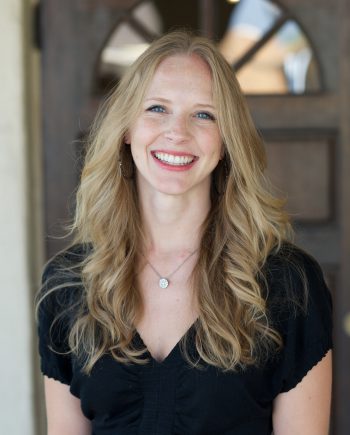
“When I went to Cal State Fullerton, I wasn’t even aware of music administration as a career option… Throughout undergrad, I was fortunate to have a mentor who worked in marketing and public relations for Cal State Fullerton’s School of Music. When I was preparing for my junior recital, I realized that life as a performing musician wasn’t for me and she suggested I look into internships with local arts organizations.” – Melissa Froehlich, PCM Director of Development
While I have enjoyed all my personal endeavors in music administration, outreach, and education, I often fall into despair at the thought of retiring my decade-long dreams and aspirations of becoming a concert pianist for more recently acquired, practical interests. It is difficult to know when to pack away the scores and close up the piano, or continue to invest in music education and have faith that there will eventually be an emotional and financial payoff. In my two years in college, there have been two experiences in particular that have prompted a moment of clarity for me during a period of doubt and motivated me to continue to pursue performance. The first experience that reinvigorated my love for performing was my sophomore recital held at PCM’s Barrett Hall last April. After officially declaring my business major in Fall 2018, I began cutting out my usual piano practice time for extra courses in accounting, statistics, and economics. After the first semester as a dual degree, I performed the worst piano jury of my college career in my sophomore fall semester (literally forgetting my music on stage!). Instead of allowing this one disappointment crumble my resolve, I analyzed my situation — what was the cause of the problem? Was it not enough practice time or not enough performance experience? I figured it was both of these things, so in my sophomore spring semester, I booked Barrett Hall, curated a program for myself, and made my best effort to put myself on stage.
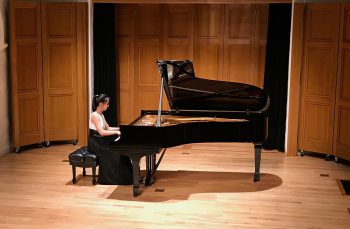
Photo from my sophomore recital
Long story short, it was one of the most rewarding endeavors of my college career, despite changing ¾ of my entire program three weeks before my recital date, missing five managerial accounting lectures to practice piano, and effectively earning a 69.9% for class attendance and participation in my general education class. While my sophomore recital was not the best performance of my life, the journey and strength it took to get myself back on stage and performing in such a vulnerable state was ultimately a rewarding experience. Most importantly, my sophomore recital helped me regain confidence that I made the right decision in choosing music as a career path. There are moments and experiences that will cause you to reevaluate what career path is the best fit for your personal aspirations and personality. In Melissa’s case, her solo recital turned her towards music management, whereas my solo recital pushed me onward with my performance major.
In some cases, these epiphanies will not come from cataclysmic experiences, but instead from subtle moments of realization when you push yourself outside of your comfort zone. One of these moments occurred to me during my time as an intern here at PCM. Within my first week in my office (a listening room within PCM’s library), I unexpectedly found myself envying students I heard in lessons or practicing for summer intensives, and yearned to be playing my instrument. While I was stationed at my desk with my spreadsheets, I introspected upon what I really wanted my future to look like from a personal and financial standpoint. I realized that my future as a performer will probably never meet my childhood expectations and dreams by a long shot. However, after stepping out of performance for the time being, I acknowledged that music and performing had to be a more immediate part of my life than it currently was and that I prioritize my happiness above my concern for financial stability. Later that week, I spoke with Eugene Kim, PCM’s events coordinator, who studied piano performance and composition at Oberlin Conservatory of Music and went on to complete his Master’s in Music at The Royal Conservatoire of the Hague. I learned that my quest for the “perfect career” might be a life-long trek, and he advised music students, like me, to embrace our musical experiences and the subsequent effects they have on our personalities and future careers.
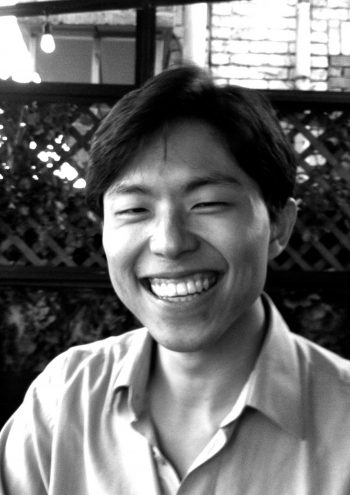
“I am still making small discoveries about myself that are pushing my boundaries, expectations, and goals for what sort of career I would like to define for myself.” – Eugene Kim, PCM Events Coordinator
However, I know that through my experimentation and exploration in other career paths I have acquired many valuable skills that will continue to serve me in the future. I recognize that many successful musicians are also great educators, skillful administrators, and so much more. I reached out to David Rodgers, a PCM alum who graduated from Vanderbilt University in piano performance with a concentration in jazz studies, toured as a keyboardist with Keb’ Mo and Taj Mahal, released an album of ten original compositions, and is now finishing up a master’s degree in commercial music composition at Belmont University. Starting up a music career is similar to a start-up business and demands that a single person maintain a variety of skill sets that will serve a supreme, long-term goal. David shared with me a particular busy week during the school year, which was densely scheduled with graduate school classes, rehearsals, classical and jazz related gigs, and blocks of time set aside for composing and private teaching. Evidently, David’s music career is constantly fueled by several musical pursuits and serves his ultimate passion for music.
“I think it’s important to develop a wide array of skill sets outside of just being skilled on your instrument. Knowing your way around Logic or ProTools, knowing how to create a quick arrangement on Finale or Sibelius, knowing how to write contracts and/or grants, knowing how to market yourself online on Instagram or Facebook — these are all skills that you don’t necessarily learn in the practice room, but will inevitably serve you in your career as a musician.” – David Rodgers, PCM alum ‘13
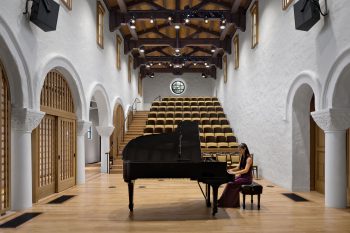
Advice for the future
While a strong work ethic, solid plan, and fierce resilience may contribute to a successful career, the greatest (and most common) piece of advice I received from my mentors is to be self-aware and honest with myself in the process of cultivating an appropriate career path. Naturally, this is easier said than done, and with only twenty years of life experience under my belt, there are a plethora of things I have yet to discover about myself.
With retrospect to my past two years in college, I realize that no one can truly tell me how to build a career in music. My greatest asset is not going to be my college advisor or even my own parents because they cannot tell me who to be in order to achieve my goals, nor can they take action on my behalf. My PCM teacher, Dr. Susan Svrcek, always reminds me that I am incredibly lucky to be “doing what I’m doing” in music and that everytime I sit at the piano, I should play like its the last time I will ever touch a piano in my life. Rather than stress over personal doubt for my future, I ought to live for the fleeting present and remind myself why I chose to pursue music in order to slowly build the pieces of who I am and who I want to be.
That being said, here are a few pieces of advice that have resonated with me:
“Allow yourself to be challenged and be open to any opportunity that comes your way because you never know where it might take you or who you might meet.” – Melissa Froehlich, PCM Director of Development
“One thing that no one can teach you is how to be you, how to discover what sort of personality you are and how you can anticipate changing throughout your life. No one is the exact same person for their whole lives, not even for a week or a day… Know yourself while also accepting that you will continue to change; don’t grieve change.” – Eugene Kim, PCM events coordinator
“If you are able to identify a truthful reason for why you are pursuing music, you are on your way to laying the foundation for a sustainable career… A career in music rarely unfolds in a predictable and scripted way.” – David Rodgers, PCM alum ‘13



